Having trouble reading this email? View it in your browser. Not interested anymore? Unsubscribe Instantly. |
||||
 |
||||
|
||||
IN FOCUS: ICT development in the Philippines
Currently, roughly three in every five (58%) Filipinos have access to the internet, according to the report, Digital, in 2017 by social media consultancy firm, We Are Social, and social media management platform, Hootsuite. This places the Philippines fifth in Southeast Asia in terms of the number of internet users, and slightly above the average global ranking based on internet penetration level, which is at 50 percent. However, while the Philippines has experienced an incredible internet population growth since 2000, researchers Jose Ramon Albert, Ramonette Serafica, and Beverly Lumbera from the Philippine Institute for Development Studies (PIDS) still noted a relatively weak uptake of ICT services in the country. In their study, Examining Trends in ICT Statistics: How Does the Philippines Fare in ICT?, Albert et al. attributed this to the high cost of ICT services. In terms of telephone services, for instance, users usually pay around PHP 1,800 for their monthly fees, currently the most expensive in the region. They observed the same scenario in other ICT services, such as mobile cellular and fixed broadband services, where the Philippines has the second and third highest retail prices, respectively, in Southeast Asia. Despite this high cost, the Philippine ICT environment remains significantly below the international standards. In a study, Rebooting Philippine Telecommunications through Structural Reform, Serafica, together with Ma. Kristina Ortiz and Jose Carlos Alexis Bairan, noted the country’s poor performance in ICT governance and regulation. Specifically, they cited the country’s failure to institute an independent regulatory body for the ICT sector, the presence of unnecessary and biased policy of requiring legislative franchise to authorize ICT service providers, and the nonissuance of unified license, as factors behind the ineffective regulatory environment in the country. To achieve an ideal ICT environment, Albert et al. urged the government to explore partnerships with the private sector for building new and better infrastructures and for upgrading the capacities of ICT staff to keep up with the fast-changing technologies. Meanwhile, Serafica et al. encouraged the creation of an independent regulatory body that has both decisionmaking powers and a stable and reliable source of revenue for their operations. They added that it should likewise have officials who have fixed terms of office that should not coincide with the tenure of the executive and legislative branches of government. In a policy note, PIDS President Gilberto Llanto also stressed the crucial importance of revisiting the radio spectrum management policy. Under the current setup, the government—through the National Telecommunications Commission (NTC)—assigns all radio frequencies to private companies and government agencies. The NTC grants licenses based on an entity’s financial and technical capacity to provide the capital and infrastructure required to optimally use the awarded spectrum bands. However, not all are using their allocated frequencies (nor paying the required fees), resulting in inefficient use of this scarce resource. Llanto suggests alternative approaches like market-based methods (e.g., auction). Ultimately, PIDS researchers recommend the formulation of better laws, rules, and regulations; increasing ICT investments to upgrade infrastructures; monitoring and regulation of network interconnectivity; and enhancements in the capacity and accountability of offices that manage the ICT sector like the Department of Information and Communications Technology. You may access the following publications as well as related studies from the PIDS website and the Socioeconomic Research Portal for the Philippines. Simply type the relevant keywords in the Search box.
|
August 24, 2017, 9-5PM July 26, 2017, 9:30-11:30AM July 11, 2017, 9:30-11:30AM
The Philippine Journal of Development is a professional journal published by the Philippine Institute for Development Studies. It accepts papers that examine key issues in development and have strong relevance to policy development. As a multidisciplinary social science journal, it accepts papers in the fields of economics, political science, public administration, sociology, and other related disciplines. It considers papers that have strong policy implications on national or international concerns, particularly development issues in the Asia-Pacific region. CLICK HERE for the guidelines in the preparation of articles. Submissions and inquiries may be sent to PJD@mail.pids.gov.ph |
|||
POLICY NOTES
ECONOMIC ISSUE OF THE DAY
|
||||
|
||||
The Philippine government spends around PHP 2.2 billion to facilitate the regulatory service for the food manufacturing industry, a study of state think tank Philippine Institute for Development Studies (PIDS) revealed. PIDS Consultant Nerlita Manalili and her co-authors said this figure is just a “conservative estimate of the total expenses incurred for regulatory purposes”, emphasizing that the country’s food manufacturing industry “is constrained by existing regulatory procedures and processes”. READ MORE |
||||
Women are still bound by gender roles when it comes to labor force participation, according to a study published by state think tank Philippine Institute for Development Studies (PIDS). The authors, PIDS Senior Research Fellow Connie Dacuycuy and Lawrence Dacuycuy, noted that despite being more empowered than women in other Asian countries, women in the Philippines still do most of the housework, resulting in minimal economic opportunities for them. READ MORE |
||||
With the recent buyout of San Miguel’s telecommunication assets, only two main players are left in the telco industry—PLDT and Globe Telecom. This move, according to Philippine Institute for Development Studies Senior Research Fellow Erlinda Medalla, has “brought a cloud of doubt as to the motives” of the transactions, which she said, can “clearly reduce competition to just two players” in the industry. READ MORE |
||||
The reduction of tariff barriers among member-states of the Association of Southeast Asian Nations (ASEAN) has caused the emergence of other trade constraints, a study published by state think tank Philippine Institute for Development Studies found out. |
||||
The implementation of the roll-on/roll-off (Ro-Ro) transport system in the country has yielded positive results, according to a study released by state think tank Philippine Institute for Development Studies (PIDS). Former PIDS Research Analyst Kris Francisco, in her paper, “The Impacts of Roll-On/Roll-Off Transport System in the Philippines”, found that the Ro-Ro program of the government has increased “household income by about 7 percent in municipalities near the Ro-Ro ports”. READ MORE |
||||
As the rainy season sets in, a researcher of state think tank Philippine Institute for Development Studies is urging government to enhance its overall disaster risk financing and insurance program and expand its mechanisms to mitigate the impact of calamities like typhoons, floods, and landslides, as well as fast-track reconstruction and rebuilding in disaster-stricken areas. READ MORE |
||||
To sustain economic gains in the country, Philippine Institute for Development Studies Board Member Alfredo Pascual urged the implementation of a cluster approach in doing business especially among small and medium enterprises. |
||||
The Philippine Institute for Development Studies conducted a six-day training course on statistical analysis for technical staff from the government of Bhutan. The workshop, which started Monday (June 19), aims to “build skills and competencies in survey report writing” using the Stata software “for carrying out data management tasks, generating statistics (including estimates of standard errors of survey estimates based on probability surveys), and producing tables and effective visualizations of statistics”. READ MORE |
||||
To address the low school participation rate of children with disabilities in poor areas of the country, a study by state think tank Philippine Institute for Development Studies recommends to government to provide mobile special education schools. PIDS Research Associate Adrian Agbon, who is part of the project, "Poverty Alleviation of Women and Children with Disabilities in Developing Countries”, explained that the presence of learning institutions in areas where persons with disabilities live can greatly affect their school attendance. READ MORE |
||||
A study by state think tank Philippine Institute for Development Studies revealed that inaccurate data on family income and household expenditure in the country can negatively affect policies on poverty reduction such as the proposed tax reform. The discussion paper specifically mentioned two sources of data on household income and expenditures in the Philippines, namely, national accounts and the Family Income and Expenditure Survey. READ MORE |
||||
Need help? Have feedback? Feel free to contact us. © 2017 Philippine Institute for Development Studies.
|
||||
 In today’s knowledge-based economy, the competitiveness of a country depends on the efficiency of its information and communications technology (ICT) sector. As such, the Philippines needs to have a reliable ICT infrastructure and an ICT-competent workforce to keep up with the digital economy.
In today’s knowledge-based economy, the competitiveness of a country depends on the efficiency of its information and communications technology (ICT) sector. As such, the Philippines needs to have a reliable ICT infrastructure and an ICT-competent workforce to keep up with the digital economy. 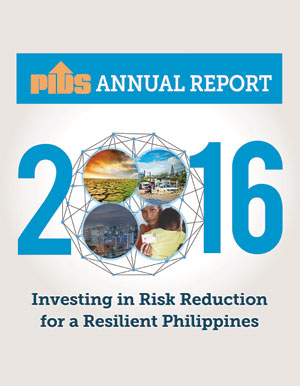
.jpg)
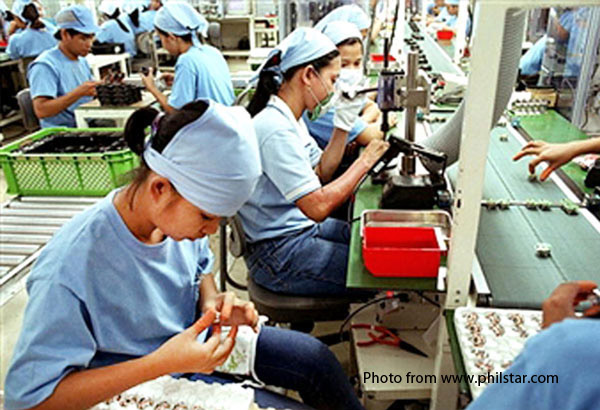 PIDS study calls to streamline regulatory policies in the food manufacturing industry
PIDS study calls to streamline regulatory policies in the food manufacturing industry 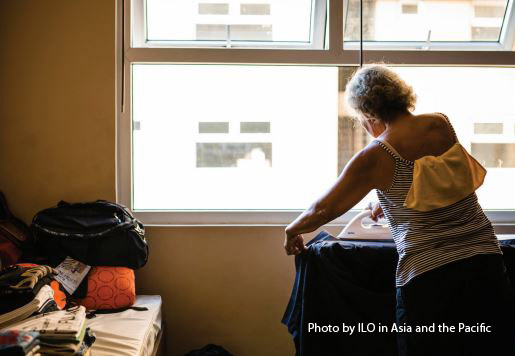 PIDS study urges gov’t to increase women’s labor participation
PIDS study urges gov’t to increase women’s labor participation  Major telcos and companies must comply with govt’s competition
Major telcos and companies must comply with govt’s competition 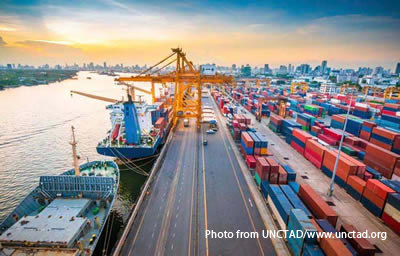 Increasing nontariff measures limit PH capacity to trade in ASEAN region—PIDS study
Increasing nontariff measures limit PH capacity to trade in ASEAN region—PIDS study  Ro-Ro transport system in PH has positive impacts
Ro-Ro transport system in PH has positive impacts 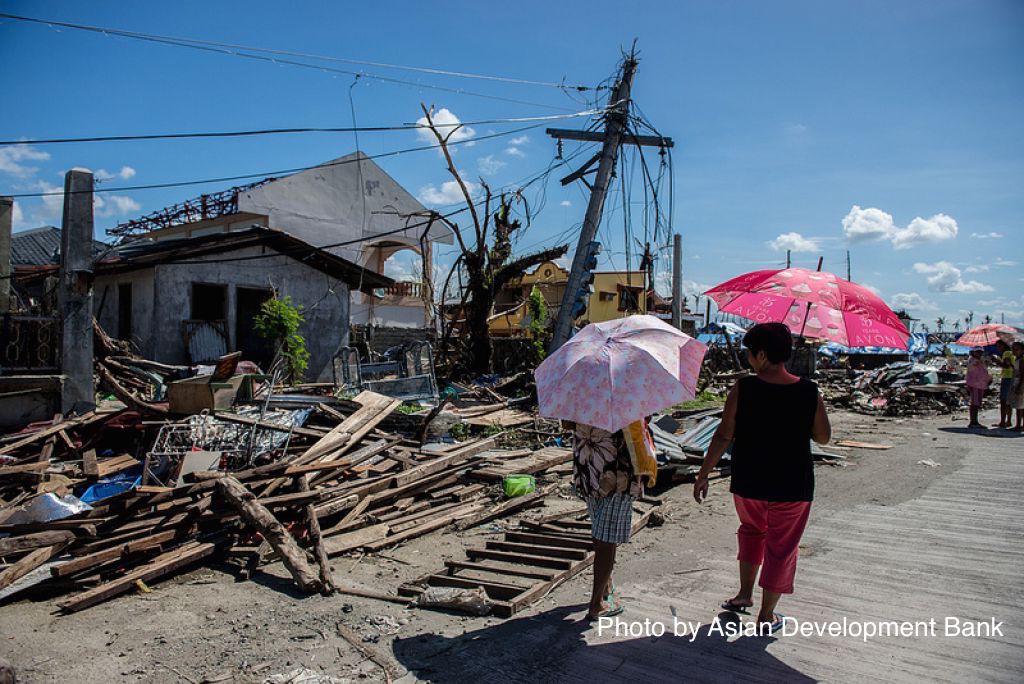 ‘Improve disaster risk financing programs for the rainy season’—PIDS researcher to gov’t
‘Improve disaster risk financing programs for the rainy season’—PIDS researcher to gov’t  Asia’s economic experts push for SMEs’ clustering to sustain PH’s economic growth
Asia’s economic experts push for SMEs’ clustering to sustain PH’s economic growth 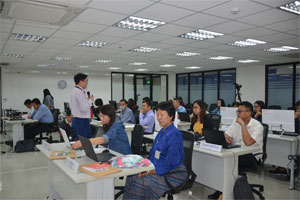 PH think tank trains Bhutan delegates on data analysis
PH think tank trains Bhutan delegates on data analysis 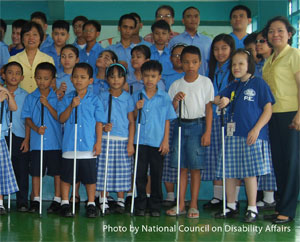 PIDS study urges gov’t to provide mobile schools for PWDs
PIDS study urges gov’t to provide mobile schools for PWDs 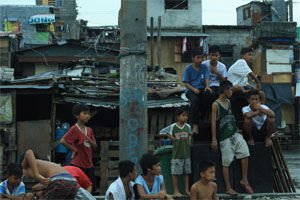 Inaccurate data on poverty have negative effects on poverty reduction programs — PIDS study
Inaccurate data on poverty have negative effects on poverty reduction programs — PIDS study 
